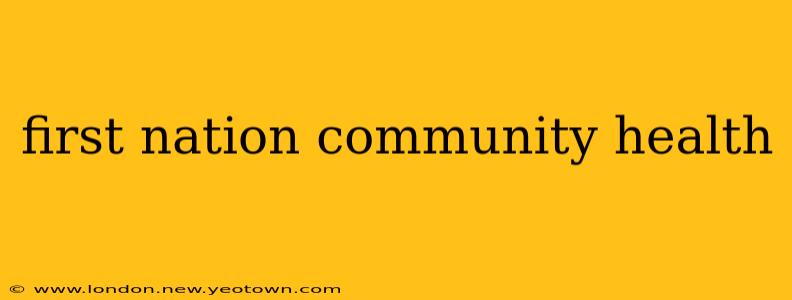The health of First Nation communities is a story woven with threads of resilience, historical trauma, and ongoing progress. It's a narrative that deserves to be told, understood, and addressed with sensitivity and respect. For generations, Indigenous peoples have faced systemic challenges that have profoundly impacted their health outcomes, yet their strength and determination to improve their well-being shine brightly. This exploration delves into the complexities of First Nation community health, addressing key concerns and highlighting the vital work being done to create healthier futures.
What are the main health challenges faced by First Nations communities in Canada?
This is a crucial question, and the answer is multifaceted. Historically, policies like residential schools inflicted deep wounds that continue to affect generations. These policies led to the disruption of cultural practices, family structures, and traditional healing methods, leaving a legacy of intergenerational trauma that manifests in various health problems. This trauma contributes to higher rates of mental health issues, substance abuse, and chronic diseases like diabetes and heart disease. Add to this the persistent challenges of access to clean water, adequate housing, and quality healthcare, and the picture becomes even more complex. The lack of economic opportunities and food insecurity further exacerbates these existing health disparities.
What is the impact of colonization on the health of First Nations people?
The impact of colonization is catastrophic and long-lasting. It's not merely a historical event; it's a living reality that continues to shape the health and well-being of First Nations people today. The forced assimilation policies disrupted traditional lifeways and knowledge systems, leading to a loss of cultural identity and traditional healing practices. This loss is deeply intertwined with the mental health challenges many First Nations communities face. The legacy of residential schools, with their profound physical and emotional abuse, has left an indelible mark on individuals and families, creating a cycle of trauma that extends across generations. This has manifested in elevated rates of suicide, substance abuse, and other mental health issues.
What are some successful First Nations health initiatives?
Despite the immense challenges, there are many examples of successful First Nations health initiatives demonstrating remarkable resilience and ingenuity. Community-led initiatives focusing on culturally safe and appropriate healthcare are proving to be highly effective. These programs often integrate traditional healing practices with modern medicine, fostering a holistic approach to health. For instance, the re-establishment of traditional medicine practices, like the use of medicinal plants and ceremonies, plays a crucial role in mental and emotional well-being. Furthermore, programs that address social determinants of health, such as improving access to safe and affordable housing, clean water, and nutritious food, are showing significant positive impacts. The emphasis is shifting towards empowerment, self-determination, and community ownership of healthcare solutions.
How can we improve healthcare access for First Nations people?
Improving healthcare access requires a fundamental shift in approach. It demands a move away from paternalistic models and towards partnerships that respect Indigenous knowledge, governance, and self-determination. This includes actively involving First Nations communities in designing and implementing healthcare programs tailored to their specific needs and cultural contexts. Increasing funding for culturally appropriate healthcare services is vital, as is addressing the significant shortage of healthcare professionals willing and equipped to work in remote and underserved communities. Furthermore, investing in infrastructure, such as improved transportation and communication networks, is crucial for ensuring access to timely and quality care.
What role do traditional healing practices play in First Nations health?
Traditional healing practices are not merely historical artifacts; they are living, vibrant systems of knowledge and care deeply intertwined with the cultural identity and well-being of First Nations communities. These practices, often involving the use of medicinal plants, ceremonies, and spiritual guidance, address the holistic needs of individuals, incorporating physical, mental, emotional, and spiritual aspects. The integration of traditional healing with modern medicine is proving to be a powerful approach, providing culturally sensitive and relevant care that respects and honors Indigenous knowledge. The resurgence of traditional healing practices signifies a vital step towards reclaiming control over health and fostering self-determination.
The journey toward improved health outcomes for First Nations communities is ongoing. It is a journey requiring sustained commitment, collaboration, and a genuine understanding of the historical and ongoing challenges faced by Indigenous peoples. By embracing a holistic approach that respects Indigenous knowledge and prioritizes community-led initiatives, we can work towards building a healthier and more equitable future for all.

